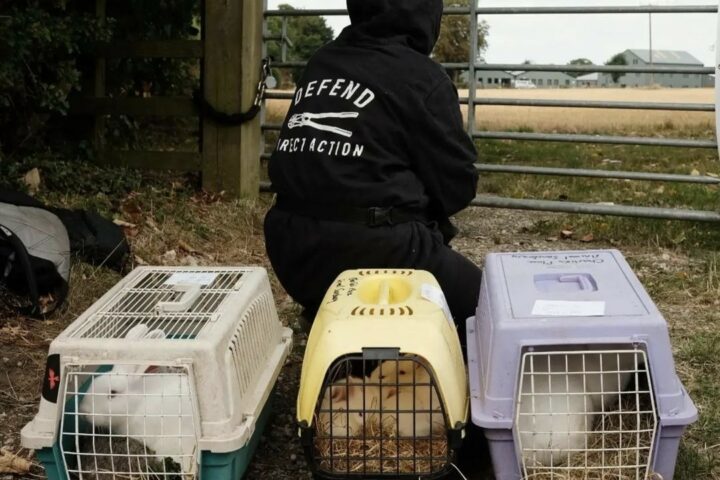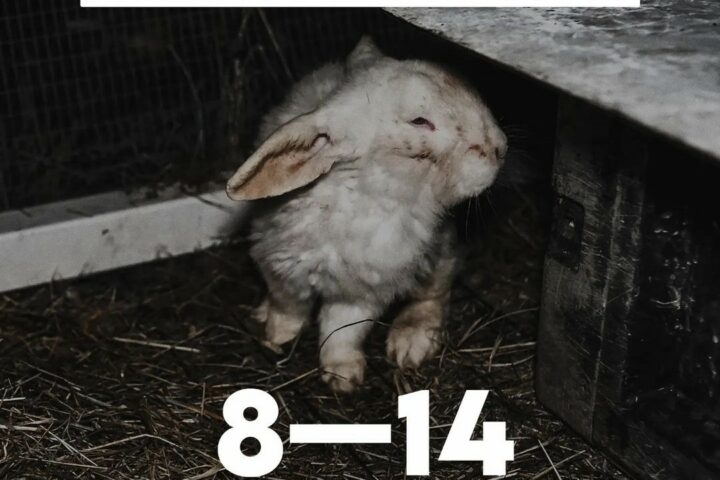About 200 people came together outside MBR Acres on 9 July to protest the company’s breeding of beagles. Marshall BioResources, which owns the MBR Acres facility in Huntingdon, breeds dogs for medical research. And protesters describe the facility as a “factory farm”.
“Really positive”
Campaign group Free the MBR Beagles has protested outside the facility for about a year. But awareness of the issue ramped up following a Mirror article on 21 June that included undercover footage from inside MBR Acres.
A spokesperson for Camp Beagle told Phoenix Media Co-op that the Mirror article led to protesters setting up the permanent camp nearby. This has enabled animal rights activists to maintain a constant presence outside the facility. And the article also led to the first major day of action on 9 July.
 Local paper Cambridge News estimated “upwards of 100 people” attended the protest. But Tommy of South Cambs Hunt Sabs, who was present throughout the day, told Phoenix Media Co-op that there were “about 200 activists during the middle of the day”. And they went on to say that the event was:
Local paper Cambridge News estimated “upwards of 100 people” attended the protest. But Tommy of South Cambs Hunt Sabs, who was present throughout the day, told Phoenix Media Co-op that there were “about 200 activists during the middle of the day”. And they went on to say that the event was:
Really positive. [There was] Vegan food, our samba protest band, speeches. The staff had been brought in early in the morning so they wouldn’t be blocked. But they didn’t get a lorry of beagles out during the day again, and at the end of the day we held the gate for about an hour and a half after they were supposed to go home.
 Another protester, Leftie of Norfolk/Suffolk Hunt Sabs, told Phoenix Media Co-op that there was a “carnival atmosphere” with the drums and supportive beeping from passing drivers. And Leftie recounted one local’s concern over the facility:
Another protester, Leftie of Norfolk/Suffolk Hunt Sabs, told Phoenix Media Co-op that there was a “carnival atmosphere” with the drums and supportive beeping from passing drivers. And Leftie recounted one local’s concern over the facility:
One woman near me became visibly distressed and as I spoke to her I learned that she lived locally and had no idea that this “Puppy Auschwitz” was on her doorstep or how she could ever sleep again until it was shut down. “All I can do is tell everyone, no one knows about this, they need to know”.
Scarlett, a beagle previously rescued from a testing lab, was also present for the day.
 Rough policing
Rough policing
Leftie told Phoenix Media Co-op that police early in the day were “only involving themselves to assist protesters with starting a stubborn generator”. But a video posted by Scott Paterson to Facebook at 4.56pm on the day shows cars waiting to leave the breeding facility. The video also shows some pushing and shoving between protesters and police.
Tommy told Phoenix Media Co-op that is “when the police got aggressive”. And they relayed their own experiences of the aggression, saying the:
cops got a bit out of control. I had my arm twisted behind my back and was thrown to the ground by a copper as I was drumming. A lot of pushing and shoving. As usual, individual coppers didn’t know the powers they were actioning.
Phoenix Media Co-op contacted Cambridgeshire Police for comment, but hadn’t received a reply at the time of publishing.
 Value of animal testing
Value of animal testing
Camp Beagle’s spokesperson explained why so many are outraged by what is going on inside MBR Acres:
The problem with MBR Acres is one that applies to the whole animal research industry. In the 21st century where we have the scientific capability of doing human-relevant research using technology, why are we still trying to turn animals into surrogate humans? Equally animals are not only sentient but capable of emotional as well as physical suffering. Beagle dogs are used because they are docile and trusting. The cynical abuse of this trust is totally unacceptable. The factory farming of these dogs to be used in toxicity research runs contrary to everything we know and understand.
MBR Acres sends beagles to testing labs when they are 16-weeks-old.
In a press statement, MBR Acres said:
Protesters trying to shut down medical and veterinary research in the UK are doing so based on misinformation. Almost every medicine we have today, including those the protesters give to their pets, has resulted from animal research.
Animals remain utterly vital to scientific breakthroughs that ensure human and animal health, they cannot by law be used if a non-animal alternative is available and they are not allowed by law to be kept in poor conditions
However, a number of research surveys during the past 15 years have suggested fundamental problems in translating animal research into human medical advances.
The spectre of SHAC
MBR Acres supplies beagles to a nearby vivisection lab owned by Covance, which previously incorporated Huntingdon Life Sciences. HLS was the target of a major campaign known as Stop Huntingdon Animal Cruelty (SHAC) during the late 1990s and early 2000s.
SHAC’s successful model of decentralised and targeted organising in the UK and internationally nearly bankrupted HLS. But its success also led to a crackdown by the British government, landing activists in prison both in the UK and the US.
Phoenix Media Co-op asked Camp Beagle’s spokesperson about what role this history plays in the current campaign. They said:
Whilst the history of SHAC and other grassroots campaigns in this area is historically significant, the current MBR campaign is different in some respects. The laws that followed on from the HLS camp and subsequent SHAC campaign mean some types of activism are not possible. However other developments mean the current MBR campaign is drawing support from other quarters. There is a much stronger lobby from those in the scientific world who oppose animal research this time. Some who are veterans of the SHAC era are around and there is now a re- emergence of the grassroots animal rights movement which is being inspired by the MBR campaign and camp.
Changing the future of animal research
The 9 July day of action’s success suggests a revitalised animal rights campaign beyond the anti-hunting movement. This is supported by a day of action in May, when animal rights group Animal Rebellion successfully shut down all four McDonald’s UK distribution centres.
Camp Beagle said that this will be crucial, not only for its campaign against MBR Acres but against the entire animal testing industry:
The future of the campaign and camp is dependent on how successfully we can reach out to not just the animal rights movement but also the public who through loving their own dogs come to truly understand what is happening at MBR. If we achieve that then we will not only free the MBR beagles but change the future direction for what happens on the issue of using animals in research.
Given the energy and vitality of the campaign against MBR Acres, this could be well within reach.
Main image via Leftie of Norfolk/Suffolk Hunt Sabs. Body images via Leftie and Camp Beagle.






